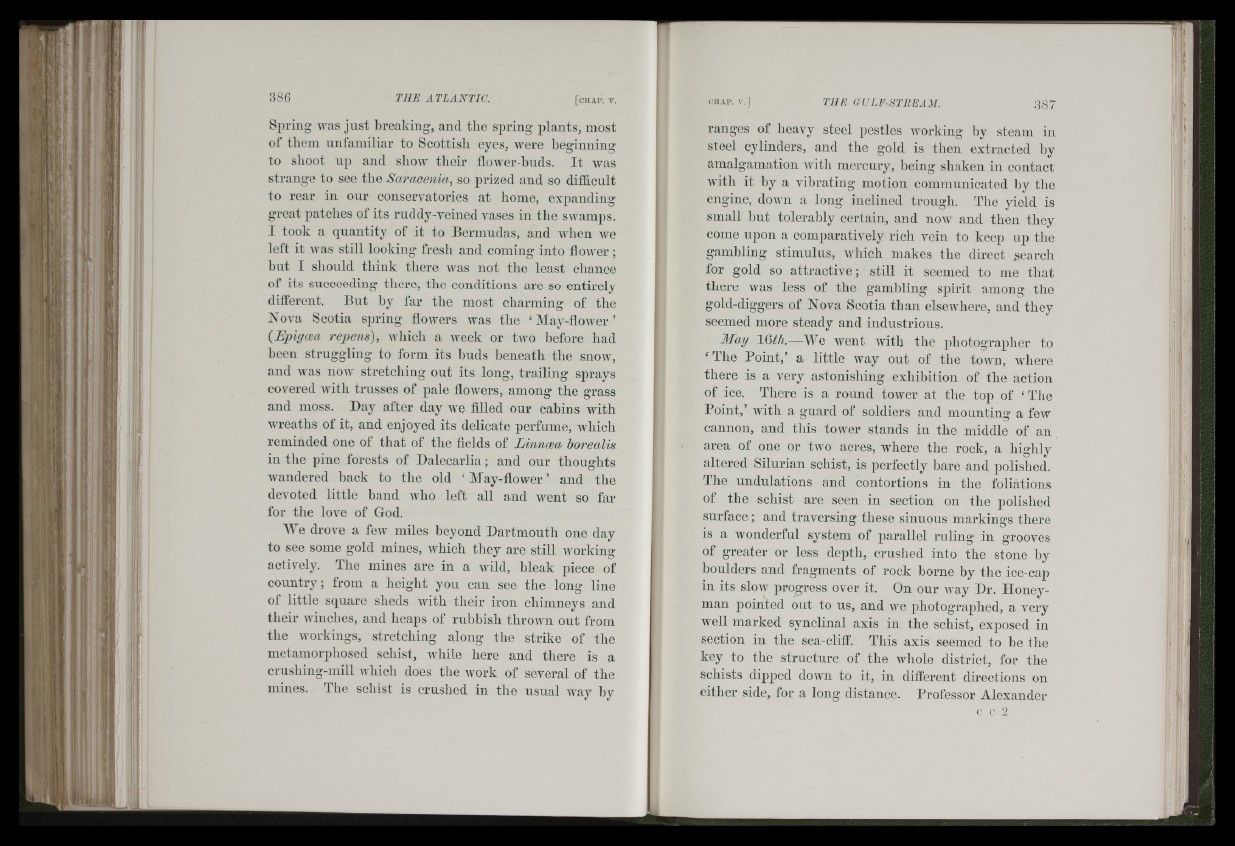
3 8 7
i l J
iiiI!
Spring was ju st breaking, and the spring plants, most
of them unfamiliar to Scottish eyes, were beginning
to shoot up and show their iiower-buds. I t was
strange to see the Saracenia, so prized and so difficult
to rear in our conservatories at home, expanding
great patches of its ruddy-veined vases in the swamps.
I took a quantity of it to Bermudas, and when we
left it was still looking fresh and coming into flower;
hnt I should think there was not the least chance
of its succeeding there, the conditions are so entirely
diiferent. But by far the most charming of the
Nova Scotia spring flowers was the ‘May-flower’
{Epigwa repens), which a week or two before had
been struggling to form its buds beneath the snow,
and was noAV stretching out its long, trailing sprays
covered with trusses of pale flowers, among the grass
and moss. Day after day we filled our cabins with
Avreaths of it, and enjoyed its delicate perfume, Avhich
reminded one of th a t of the fields of Linnwa borealis
in the pine forests of Dalecarlia; and our thoughts
Avaiidered back to the old ‘ May-flower ’ and the
devoted little band avIio left all and went so far
for the love of God.
AVe drove a few miles beyond Dartmouth one day
to see some gold mines, which they are still working
actively. The mines are in a Avild, bleak piece of
country; from a height you can see the long line
of little square sheds Avith their iron chimneys and
their Avinches, and heaps of rubbish throAvn out from
the Avorkings, stretching along the strike of the
metamorphosed schist, Avhile here and there is a
crushing-mill Avhich does the AVork of several of the
mines. The schist is crushed in the usual way by
ranges of heavy steel pestles Avorking by steam iu
steel cylinders, and the gold is then extracted hy
amalgamation Avith mercury, being shaken in contact
with it hy a vibrating motion communicated by the
engine, doAvn a long inclined trough. The yield is
small hut tolerably certain, and now and then they
come upon a comparatively rich vein to keep up the
gambling stimulus, Avhich makes the direct .search
for gold so attractive; still it seemed to me th a t
there was less of the gambling spirit among the
gold-diggers of Nova Scotia than elsewhere, and" they
seemed more steady and industrious.
May Votli.—AAfo ^ e n t Avith the photographer to
‘ The Point,’ a little way out of the town, where
there is a very astonishing exhibition of the action
of ice. There is a round tower at the top of ‘The
Point,’ with a guard of soldiers and mounting a few
cannon, and this toAver stands in the middle of an
area of one or two acres, where the rock, a highly
altered Silurian schist, is perfectly bare and polished.
The undulations and contortions in the foliations
of the schist are seen in section on the polished
surface; and traversing these sinuous markings there
is a wonderful system of parallel ruling in grooves
of greater or less depth, crushed into the stone hy
boulders and fragments of rock borne by the ice-cap
in its slow progress over it. On our Avay Dr. Honeyman
pointed out to us, and we photographed, a very
well marked synclinal axis in the schist, exposed in
section in the sea-cliff. This axis seemed to be the
key to the structure of the Avhole district, for the
schists dipjDed doAvn to it, in diiferent directions on
either side, for a long distance. Professor Alexander
c c 2
'II!
¡i 1
i :
V"